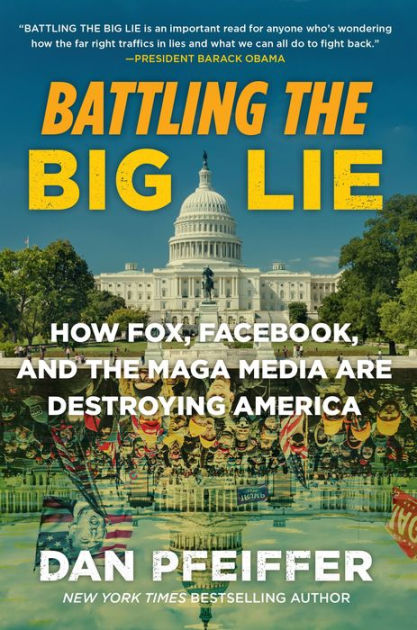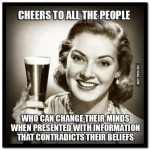- Joined
- Apr 22, 2019
- Messages
- 46,895
- Reaction score
- 22,868
- Gender
- Male
- Political Leaning
- Progressive
There's something not very intuitive, that explains a lot about public opinion and how it's influenced, and that's the difference between 'accuracy' and 'volume'. This is related to the 'big lie' observation that a lie repeated many, many times tends to get accepted as true.
We like to think 'the truth' has an edge. Did you know Mexico has more people than China? Did you know that trump killed Osama bin Laden? Did you know that global warming claims are a hoax by scientists to get a ton of money for them to 'solve' it?
You would like to think the truth matters on those claims. It's not intuitive, but largely the case, that when the lie version of them is hear a thousand times and the truth not at all, THAT carries far more weight than the accuracy.
Let's make up an example. Assume that trump has clearly worse speech than Biden and shows more signed of mental decline than Biden, objectively.
But when you have thousands of claims about Biden being 'senile' made over years and little is heard on the other side - people tend to get caught up believing it's true about Biden and not trump. They to like believing it, to like telling others 'their' opinion on it, they enjoy joking with friends about Biden's dementia and how idiotic Americans are who support him. Volume defeats accuracy.
In most topics, there is no 'side' trying to promote a false claim - and so accuracy usually has that edge, and that makes it seem like it does more often than it does. Who won the best picture Oscar, Japan attacking Pearl Harbor, pets being entertaining - these are topics with no one trying to push lies, and there isn't really disagreement, there's basically honest discussion.
And that makes it all the less clear to people when there IS a lie being pushed. "Everyone knows Biden is senile", because they've heard that over and over and over, and the people they know who hear the same lie agree with them - it's just as clearly true to them as 'Biden has gray hair'. Volume is very powerful in influencing opinion.
So much so it's hard to help people recognize it, or when they've fallen for it; it's easier when you point it out in other countries, where it's easier to see because they haven't had the same volume aimed at them - you can point to lies the Chinese people believe because the government has volume, to Russians who believe Putin because he has volume, and it'll be more clear.
On issues where the are billions of dollars or power at stake, there are liars with a very high volume propaganda machine and many Americas fall for it, not understanding how powerful the loud volume of lies is. Issues like inequality, or harm to the climate from fossil fuels, or items used to strengthen party loyalty (e.g., attacks on "CRT" or transgender rights).
Many times, I see people who strongly believe clear lies, strongly, because of this issue. The lie is all they've heard, and they've heard it repeatedly, and people they know agree with them. 'Everyone knows' it's true. I'm talking about 'extreme lies' along Qanon lines as well as less extreme but still clear lies.
And behind this propaganda machine is a drive for power. To use issues to constantly try to keep people supporting the Republican Party, in order for it to get power for the ulterior motives of the people it serves. Everything is partisan for the people doing this; if someone cured cancer, they'd be praised if Republican and attacked if Democrat - and at the same time they'll attack the other side as overly partisan.
That's their goal. Just as big brands want you to 'feel more comfortable' spending more to buy their name brands, advertisers want people to 'feel comfortable' identifying as a Republican, and so just as you see advertising for name brands to build loyalty to them, you see manipulations to make people want to be Republican and to fear and hate and oppose Democrats, and truth is not an obstacle.
It doesn't always take lying - far more effective is selectivity. Just say "CRT" a thousand times, "immigrants" a thousand times, and that's what people care about. Not issues like, say, inequality or the environment. No need to mention those. Here's an example of the simple difference of what's covered - the volume for each topic on Fox and CNN, showing examples of what Fox gives volume what it's silent about, influencing viewers:


We like to think 'the truth' has an edge. Did you know Mexico has more people than China? Did you know that trump killed Osama bin Laden? Did you know that global warming claims are a hoax by scientists to get a ton of money for them to 'solve' it?
You would like to think the truth matters on those claims. It's not intuitive, but largely the case, that when the lie version of them is hear a thousand times and the truth not at all, THAT carries far more weight than the accuracy.
Let's make up an example. Assume that trump has clearly worse speech than Biden and shows more signed of mental decline than Biden, objectively.
But when you have thousands of claims about Biden being 'senile' made over years and little is heard on the other side - people tend to get caught up believing it's true about Biden and not trump. They to like believing it, to like telling others 'their' opinion on it, they enjoy joking with friends about Biden's dementia and how idiotic Americans are who support him. Volume defeats accuracy.
In most topics, there is no 'side' trying to promote a false claim - and so accuracy usually has that edge, and that makes it seem like it does more often than it does. Who won the best picture Oscar, Japan attacking Pearl Harbor, pets being entertaining - these are topics with no one trying to push lies, and there isn't really disagreement, there's basically honest discussion.
And that makes it all the less clear to people when there IS a lie being pushed. "Everyone knows Biden is senile", because they've heard that over and over and over, and the people they know who hear the same lie agree with them - it's just as clearly true to them as 'Biden has gray hair'. Volume is very powerful in influencing opinion.
So much so it's hard to help people recognize it, or when they've fallen for it; it's easier when you point it out in other countries, where it's easier to see because they haven't had the same volume aimed at them - you can point to lies the Chinese people believe because the government has volume, to Russians who believe Putin because he has volume, and it'll be more clear.
On issues where the are billions of dollars or power at stake, there are liars with a very high volume propaganda machine and many Americas fall for it, not understanding how powerful the loud volume of lies is. Issues like inequality, or harm to the climate from fossil fuels, or items used to strengthen party loyalty (e.g., attacks on "CRT" or transgender rights).
Many times, I see people who strongly believe clear lies, strongly, because of this issue. The lie is all they've heard, and they've heard it repeatedly, and people they know agree with them. 'Everyone knows' it's true. I'm talking about 'extreme lies' along Qanon lines as well as less extreme but still clear lies.
And behind this propaganda machine is a drive for power. To use issues to constantly try to keep people supporting the Republican Party, in order for it to get power for the ulterior motives of the people it serves. Everything is partisan for the people doing this; if someone cured cancer, they'd be praised if Republican and attacked if Democrat - and at the same time they'll attack the other side as overly partisan.
That's their goal. Just as big brands want you to 'feel more comfortable' spending more to buy their name brands, advertisers want people to 'feel comfortable' identifying as a Republican, and so just as you see advertising for name brands to build loyalty to them, you see manipulations to make people want to be Republican and to fear and hate and oppose Democrats, and truth is not an obstacle.
It doesn't always take lying - far more effective is selectivity. Just say "CRT" a thousand times, "immigrants" a thousand times, and that's what people care about. Not issues like, say, inequality or the environment. No need to mention those. Here's an example of the simple difference of what's covered - the volume for each topic on Fox and CNN, showing examples of what Fox gives volume what it's silent about, influencing viewers:




